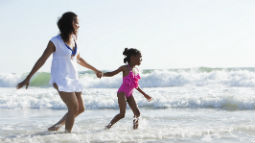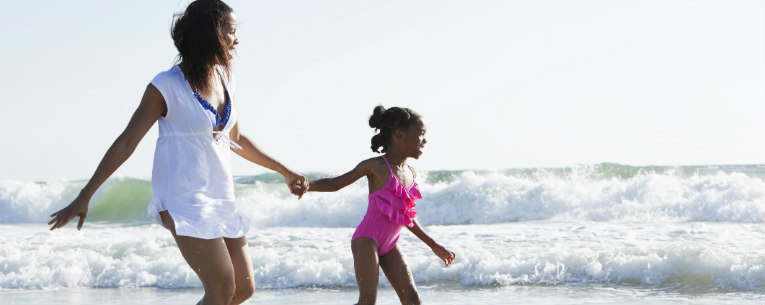Sunscreen? Check. Lifejacket? Check. You know the drill. But when it comes to staying safe on your summer vacation, there are other hazards you may not have thought about. These 10 summer vacation safety tips will help keep your family out of danger at the beach, by the pool, in the woods and on the road.
Summer safety tip 1: Drowning is quiet.
Everyone thinks that people who are drowning yell, thrash and splash. They don't. Drowning doesn't look like drowning, as former Coast Guard rescue swimmer Mario Vittone explains. People in serious distress lose their ability to call out for help or wave. Instead, their instinctive drowning response causes them to hover upright at the surface of the water with their head tilted back and mouth open, gasping or hyperventilating.
Summer safety tip 2: Use “touch supervision” with young children around pools.
Home — or vacation home — swimming pools are a particular hazard for very young children (aged 1 to 4). It may be tempting to dive into a magazine or a cocktail while you're sitting poolside, but if young children are around you should stay focused on them. Amid the chaos of a family beach rental, it only takes a moment of inattention to place a child at risk of drowning.
The CDC recommends designating one adult to watch all children swimming or playing in or around water. Supervisors of preschool children should practice “touch supervision,” which means being close enough to reach the child at all times. About half of child drownings take place within 25 yards of an adult.1
Summer safety tip 3: Know the warning signs of sharks.
Compared to other summer vacation safety threats, shark attacks are extremely unlikely. However, they do happen. Here are a few tips for avoiding sharks:
- Don't swim at dawn or dusk, or after heavy rains.
- Don't swim near fishing piers, where sharks may be attracted by bait.
- If you see small fish schooling and jumping out of the water, a shark may be nearby.
- Sharks are attracted to mouths of rivers, channels, deep drops and areas between sandbars.
- Watch for blue or purple flags, which indicate sharks, jellyfish or other dangerous marine life.2
Summer safety tip 4: Know your vehicle load limits.
Can't fit the kids, the beach chairs and all the suitcases in your vehicle? A rooftop carrier makes packing for your summer vacation much easier. But don't stuff it to the gills. Read the car's manual first to figure out the dynamic weight limit for the roof rack. It’s probably less than you think; on average, 165 pounds is the max.3 And remember that adding rooftop cargo raises the center of gravity, which can cause an SUV to sway or become less stable on the road.
Summer safety tip 5: Don’t trust your GPS/phone maps.
A Texas college student was sightseeing near the Grand Canyon when she followed her GPS down a road that wasn’t actually there.4 She ran out of gas and endured five days in the desert before being located — thanks to the efforts of rescuers and her decision to leave a note in her abandoned car, explaining where she had gone. The story illustrates one of the most important travel safety tips: Always have a backup plan. Paper maps are a good idea to carry, along with emergency water, food, and other supplies.
Summer safety tip 6: Steer clear of wildlife.
Many wild animals are drawn to campgrounds because they can forage in trash or snag snacks from tourists. Every year brings news accounts of people being attacked on their summer vacation by animals like bears and bison. The key thing to remember is that most animal attacks are provoked. Never, never feed or harass wildlife, even if you see other people doing it. And remember that bees, deer, dogs and cows kill a lot more people than alligators and bears.
Summer safety tip 7: Spray your shoes.
Picking off a few ticks used to be a normal rite of summer vacation. Now it's cause for alarm, as scientists have discovered more than 14 diseases spread by ticks, including Lyme disease, babesiosis and powassan virus.5 Ticks are spreading, and reports of disease have shot up. How can you keep your family safe? Science writer Melinda Wenner Moyer recommends spraying children's and adults' shoes with permethrin and doing daily tick checks.
Summer safety tip 8: Use the teddy-bear system.
No parent ever thinks he or she would leave a child locked in a car. But tragically, children die from heatstroke in hot cars every year, often because a distracted parent simply forgets the child's in the back seat. To prevent this, keep a teddy bear in the child's safety seat. When the child's buckled in, move the teddy to the front seat as a reminder that the back seat is occupied.6
Summer safety tip 9: Plan ahead to keep pets safe.
Like young children, pets are vulnerable to injury when left in hot cars. Even when the outside temperature is 60 degrees, the sun can raise it to 110.6 If your dog is coming along on your summer vacation road trip, plan ahead for how you'll keep him cool. Can you pack picnic lunches, or find restaurants that allow dogs on the patio? What will you do if you need to run an emergency errand?
Summer safety tip 10: Make sure you’re protected in case of medical emergencies.
If your summer travel plans take you on a cruise, out of the country, or to more remote areas of the United States, you should have travel insurance with emergency medical benefits and emergency medical transportation benefits. These benefits can cover your medical care and/or emergency transportation if you experience a covered medical emergency while traveling, protecting you from unexpected (and enormous) medical bills. Find a plan today.
Richmond-based travel writer Muriel Barrett has a terrible sense of direction, and has spent many happy hours getting lost in Barcelona, Venice and Jerusalem. Her favorite travel memories all involve wildlife: watching sea turtles nest in Costa Rica, kayaking with seals in Vancouver and meeting a pink tarantula in Martinique.
Related Articles









Share this Page